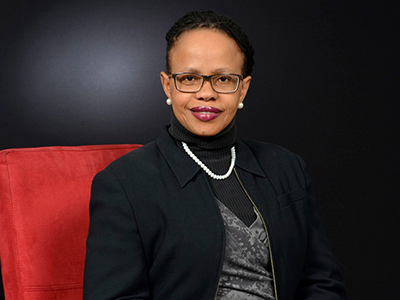Leading change
My vision for Unisa research is that of unyielding excellence—Meyiwa

She intends to focus fully on the university’s core DNA as well as leverage its core competency and insights drawing from its context. “Under my guidance and guard, I will maximise the consciousness of ensuring that Unisa’s research has a distinct brand; that our brand improves,” she affirms.
Read on for more about this transformative leader in her own words.
What are your aspirations in your position as Vice-Principal of Research, Postgraduate Studies, Innovation, and Commercialisation?
The vision I have for Unisa research is that of unyielding excellence. In the next five years I plan to make a contribution within the Unisa research portfolio, towards maximising it to being a more competitive, inspired, transformed, and sustainable portfolio. This will be underpinned by ensuring that, in line with Unisa’s Strategic Plan (2016-2023), I consciously drive the portfolio to be true to its DNA of being innovative with a commercial nuance.
As the executive in charge of research I commit to the university and, in particular, to her researchers, to provide an ethos and an enabling environment for research. We will have to confidently claim and affirm our identity as one of the leading distance education institution globally, by being consistent in providing innovative research with an intellectual rigour.
I subscribe to Jack Welch’s statement that unless we “control our own destiny, someone else will”. Thus, working with my colleagues and sourcing their contribution and critique, the following elements form part of my vision for the portfolio:
- Plan far ahead in all that we do, to instil confidence in the future. We would need to think of and plan for a Unisa that shall happen at least one generation beyond our time.
- Focus fully on our core DNA as well as leverage our core competency and insights drawing from our context. Under my guidance and guard, I will maximise the consciousness of ensuring that Unisa’s research has a distinct brand; that our brand improves.
- Be cognisant of and be responsive to the South African context in which we operate, first from the local and immediate environment. As an open, distance, and e-learning (ODeL) university, the environment in which we operate would of course be virtual at most; however, with appreciation of the need to modify our ‘performance’ to suit our context. I firmly believe that today’s changing world needs agility to cope.
- Categorically understand that our students are Unisa’s crucial client and the first context of our operations. I am of the view that we exist to serve students; if you pull students out of a higher education institution ecosystem, universities will cease to exist as we have known them—be they contact or distant institutions.
- Strengthen partnerships, within and external to Unisa. I hold that human relations are crucial in building institutions. The manner in which we relate to each other as human beings makes or breaks organisations and relationships of all kinds.
You have joined the university to continue your love and passion for research. What is your biggest challenge as a researcher now that you are a vice-principal?
Balancing administrative imperatives, family life as a “migrant labourer” and my own research—towards the goal of not becoming an absent researcher from research.
Your former colleagues at the Durban University of Technology list your leadership skills and spirituality as the two outstanding qualities that make you unique. Would you agree? Why?
I must be honest that I did not realise that spirituality was found by DUT as one of my leadership elements. Despite not claiming I know what they meant, I cannot disagree with them, though. In retrospect, I have made efforts to get both my colleagues and students to look at a bigger picture in all that we do; that each one of us has a noble purpose for which we were brought to this world. And that, that purpose at each point of our lives, is connected to each other’s purpose. I hold that wherever we find ourselves geographically or otherwise, is not by accident but it is by design towards achieving a bigger and broader purpose—a good purpose, of course.
Name one short-term goal as VP?
I have two, actually, in view of my understanding of a short-term goal meaning six months:
- To ensure that lines of authority and managerial accountability are clear, i.e. we identify and list them, and that collectively we spell out our managers’ roles and accountability versus my role as the ultimate accounting executive, and
- To reach consensus about what the goal of the research portfolio is and setting a path of achieving the goal with tangible and feasible deliveries.
What are your research interests?
I am a multi-disciplinary social scientist and an honorary researcher at DUT and the University of KwaZulu-Natal, respectively. My scholarship and research leadership can be broadly defined as TRANSFORMATIVE in nature, as it is a multidisciplinary kind of scholarship that seeks to bring about change.
My areas of research interest include feminist research, indigenous knowledges, action research with a strong nuance towards self-study research, cultural constructions of gender, and the impact of HIV/AIDS on parenting. I have run a number of courses, conducted research and published in these various areas—from which I derive my ‘academic activism’, which draws its ‘soul’ mainly from societal problems. The thread amongst this work is a quest for change, care and/or an improved life experience for the marginal and vulnerable, namely, women, children, rural communities, etc.
*Interview by Sharon Farrell
Publish date: 2018-06-18 00:00:00.0